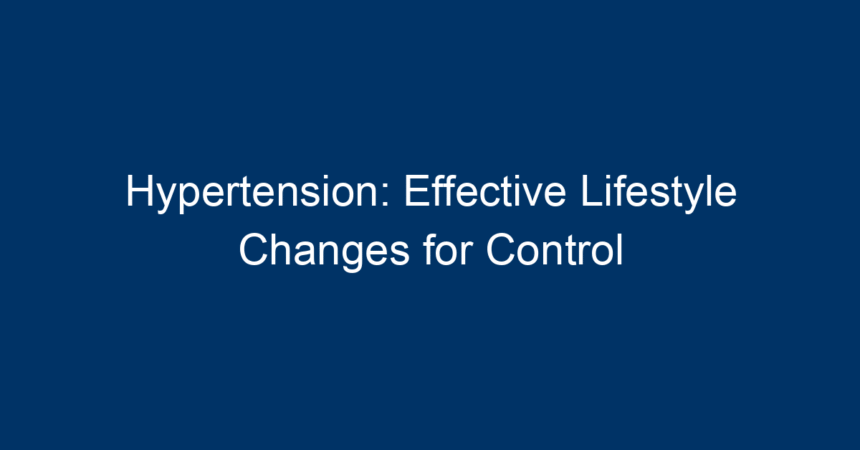Hypertension, commonly known as high blood pressure, is a silent killer affecting millions worldwide. Often dubbed the “silent disease,” hypertension can lead to severe health complications including heart disease, stroke, and kidney failure if left unmanaged. Fortunately, adopting a few effective lifestyle changes can significantly lower your blood pressure and enhance your overall health. In this article, we’ll delve into various strategies to control hypertension effectively, promoting better health and well-being.
Understanding Hypertension
What is Hypertension?
Hypertension refers to the condition where the force of the blood against the artery walls is consistently too high. Blood pressure readings are given in millimeters of mercury (mmHg) and expressed in two numbers: systolic (the pressure when your heart beats) over diastolic (the pressure when your heart rests). A normal blood pressure reading is typically around 120/80 mmHg, while hypertension is generally defined as a reading of 130/80 mmHg or higher.
Causes and Risk Factors
Before diving into lifestyle changes, it’s essential to understand the causes and risk factors associated with hypertension. These may include:
- Genetics: A family history of hypertension increases your risk.
- Age: The risk of developing hypertension increases with age.
- Obesity: Excess weight puts additional strain on your heart and blood vessels.
- Sedentary Lifestyle: Lack of physical activity can lead to higher blood pressure.
- Poor Diet: A diet high in sodium, saturated fats, and processed foods can contribute to hypertension.
- Stress: Chronic stress may contribute to higher blood pressure.
- Tobacco and Alcohol Use: Smoking and excessive alcohol consumption can damage blood vessels and increase blood pressure.
Understanding these factors is crucial for effectively managing hypertension.
Effective Lifestyle Changes to Control Hypertension
1. Adopt a Heart-Healthy Diet
A heart-healthy diet plays a vital role in controlling hypertension. Here are some dietary modifications you can make:
The DASH Diet
The Dietary Approaches to Stop Hypertension (DASH) diet is a well-researched eating plan aimed at lowering blood pressure. It emphasizes:
- Fruits and Vegetables: Aim for at least five servings a day.
- Whole Grains: Include whole-grain bread, oatmeal, and brown rice.
- Lean Proteins: Incorporate fish, chicken, legumes, and nuts.
- Low-Fat Dairy: Choose low-fat or fat-free options when possible.
- Limit Sodium: Aim for less than 2,300 mg of sodium per day; reducing it to 1,500 mg can provide even greater benefits.
Reduce Sodium Intake
Processed and packaged foods often contain hidden sodium. Reading labels and choosing low-sodium options can significantly reduce your sodium intake. Cooking at home using fresh ingredients allows you to control how much salt goes into your meals.
2. Regular Physical Activity
Engaging in regular physical activity is one of the most effective lifestyle changes you can make to control hypertension. Aim for at least 150 minutes of moderate-intensity aerobic exercise each week, such as:
- Walking
- Cycling
- Swimming
- Dancing
Benefits of Exercise
Regular exercise strengthens your heart, allowing it to pump blood more efficiently. This lowers the pressure on your arteries. Additionally, exercise helps with weight management and can reduce stress, contributing to better overall health.
3. Maintain a Healthy Weight
Being overweight or obese raises your risk of hypertension. Losing even a small amount of weight can help reduce your blood pressure. Here are a few tips to help maintain a healthy weight:
- Mindful Eating: Pay attention to portion sizes and avoid distractions while eating.
- Track Your Food Intake: Keeping a food diary can help you stay accountable.
- Stay Active: Incorporate more movement into your daily routine, whether it’s taking the stairs or walking during lunch breaks.
4. Manage Stress Effectively
Chronic stress is a significant risk factor for hypertension. Implementing stress management techniques can promote better blood pressure control. Consider incorporating the following into your daily routine:
- Mindfulness and Meditation: Practicing mindfulness can help you stay calm and focused.
- Yoga or Tai Chi: These practices combine physical activity with relaxation, reducing stress and promoting heart health.
- Deep Breathing Exercises: Take a few moments each day to practice deep breathing to alleviate tension.
5. Limit Alcohol Consumption
Excessive alcohol consumption can elevate blood pressure. Aim to limit intake to moderate levels:
- For women: Up to one drink per day.
- For men: Up to two drinks per day.
Be mindful of the type of alcoholic beverages you consume as well; sweet drinks can contribute to poor dietary choices and weight gain.
6. Quit Smoking
The harmful chemicals in tobacco can damage blood vessels and increase blood pressure. Quitting smoking not only benefits your blood pressure but also improves your overall cardiovascular health. Seek support through:
- Counseling or Support Groups: Engaging with others can provide motivation.
- Nicotine Replacement Therapies: Consider using patches, gums, or medication to manage withdrawal symptoms.
7. Regular Health Screenings
Monitoring your blood pressure regularly can help you stay informed about your health status. Regular check-ups with your healthcare provider are essential for:
- Adjusting treatment plans as needed.
- Receiving guidance on further lifestyle changes.
- Managing any other health issues that might exacerbate hypertension.
Conclusion: Taking Charge of Your Health
In conclusion, managing hypertension involves not only following medical advice but also making significant lifestyle changes. By adopting a heart-healthy diet, engaging in regular physical activity, maintaining a healthy weight, managing stress, and monitoring your health, you can effectively control your blood pressure and improve your overall well-being.
Actionable Insights:
- Start a Food Journal: Track your dietary intake over a week to identify areas for improvement.
- Set Realistic Fitness Goals: Incorporate physical activity into your daily routine gradually.
- Join a Support Group: Engage with others on a similar journey towards heart health.
- Educate Yourself: Read reputable resources on hypertension and stay current with health guidelines.
By implementing these actionable steps, you can take charge of your health and significantly reduce your risk of complications associated with hypertension. Start today and pave your way to a healthier future!




